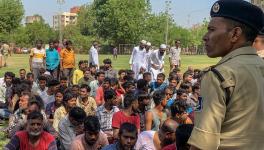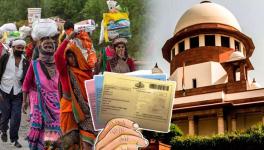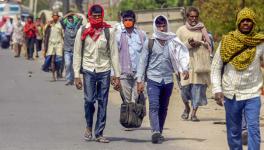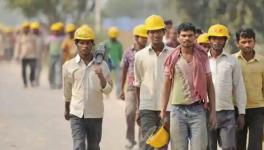Why Home Ministry’s Travel Plan for Migrant Workers Will Create More Chaos
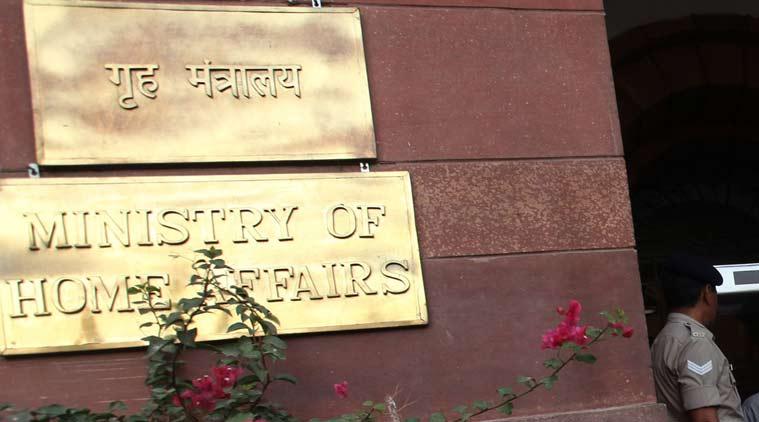
Representational Image.
New Delhi: There seems no end to the miseries of migrant workers and their families, as the latest travel plans released by the Home Ministry on Ma y 11, showing 10 glaring gaps that could lead to more chaos and confusion as they struggle to get back home.
Pointing out these gaps in procedures based on numerous frantic calls, the Stranded Workers Action Network or SWAN and covid-india.in have written to the Home Ministry, saying that the order dated may11, specifying the standard operating procedure (SOP) is “incomplete and vague.”
“Since April 29, the Ministry of Home Affairs (MHA) has issued 4 travel related orders for inter state migrant inter state migrant workers. On May 11, the MHA issued an 8 point Standard Operating Procedure (SOP). While the earlier orders were confusing and conflicting, the order dated May 11 is incomplete and vague,” said a joint press rleases by the two organisations, which are doing relief work among stranded migrant workers.
With daily reports of migrant deaths, women and children being packed like sardines in trucks and workers being drained of all their savings, cashing in on their desperation to each home, India is standing out in the world as a massive humanitarian crisis unfolds following the sudden lockdown on March 24 midnight, stranding lakhs of workers and their families.
Pointing out some gaps in the May 11 SOP issued by the Home, SWAN said each state has developed its own web portal to register workers. “However, there is confusion as to whether workers have to register on portals of both states -- the states where they are stranded and the states where they intend to return.“
Also, many portals are largely in English or in the local language of the resident state while most migrants may not even be conversant in these languages.
Most workers are stranded as families or groups, but some portals do not allow group registration, it pointed out, adding that some portals were asking for scanned ID proofs with size limitations (in MB) and specified file formats, while some others have mandatory captchas to enter, which is unfathomable for poor migrant workers.
Incidentally, the portals for Delhi and Bihar are non-functional, it pointed out.
Read the full statement below:
The Stranded Workers Action Network (SWAN) has been receiving frantic calls from workers desperate to know the procedures to return home. Since the lockdown SWAN has been doing relief work for stranded migrant workers across the country. SWAN released two reports based on the relief work: one on April 15 and thesecond report on May 1. SWAN has also been trying to assist migrants who wish to return home, and have collaborated with the COVID Order tracker team at covid-india.in to set up a portalto collate travel procedures related announcements and orders put out by various states. The state travel orders and the vague MHA orders have resulted in much chaos among workers and administrators alike.
Since April 29, the Ministry of Home Affairs (MHA) has issued 4 travel related orders for inter state migrant inter state migrant workers. On May 11, the MHA issued an 8 point Standard Operating Procedure (SOP). While the earlier orders were confusing and conflicting, the order dated May 11 is incomplete and vague.
Further, the travel protocols established by different state governments have many gaps in addressing the larger problem. Consequently, a second exodus of migrant workers walking home has begun with tragic reports of deaths along the way. The most horrific of these was 16 people being run over by a train while they slept on railway tracks in Maharashtra. The irony of having died under the wheels of a train they hoped would take them home will haunt us. In another incident, a migrant worker walking home from Telangana to Chhattisgarh had to deliver her baby by the roadside.
We outline some critical issues with the current process. SWAN and the covid-india.in team have communicated feedback from workers along with a detailed suggested SOP to the MHA for urgent consideration. The SOP sent to the MHA is attached.
Critical Problems with the Current Process
(1) The travel registration procedure lacks clarity and standardisation.
- Each state has developed its own web portal to register workers. However, there is confusion as to whether workers have to register on portals of both states -- the states where they are stranded and the states where they intend to return.
- Many portals are largely in English or in the local language of the resident state while most migrants may not even be conversant in these languages.
- Most workers are stranded as families or groups, but some portals do not allow group registration.
- Some portals require scanned ID proofs with size limitations (in MB) and specified file formats, while some others have mandatory captchas to enter.
- Portals for Delhi and Bihar are non-functional.
Additionally, in some places, workers have been asked to go to police stations to register. There is, however, no transparency on how those registered in police stations are being entered on the web portals. Numerous workers have been made to leave police stations without registration and there are reports of some being beaten up at the police stations.
(2) Post-registration processes remain unclear. After registering on state portals, like Jharkhand, migrant workers did not receive any confirmation. For those who successfully register, there is no tracking mechanism to know about their application status. Policies being followed to prioritise selection of travellers are not transparent. Procedures for travel post-registration are either unavailable or do not meet the requirements of migrant workers. In the case of West Bengal, people who filled the form to return to Jharkhand received a notification asking for private vehicle information. Schedules of trains are published by only some states and in an ad hoc manner. There are no public spaces, mechanisms, or specific portals for sharing this and no further efforts made to ensure that this critical piece of information reaches the affected parties.
(3) Government orders about ticket fare waivers or travel procedures lack clear steps. Even when some of the states or the Centre have agreed to waive ticket fares or make buses free of cost, workers do not know how to access these free facilities.
(4) Emerging black market for tickets. In the absence of information on number trains that will run, schedules, transparent processes for seat allotment, a black market has developed overnight. Migrants have reported paying between Rs. 1500-8000 to register for travel by bus and trains.
Ten Gaps in the Eight Point SOP issued by the MHA On May 11: In light of the above existing problems, the SOP issued by the MHA on May 11 fails to address several critical features. First, it does not detail how online and offline registrations will be coordinated. Second, the logistics and the basis for allotment of passengers to trains remains unclear. Third, there are no protocols regarding information dissemination to workers about the travel plan and schedule in an easily accessible manner. Fourth, it does not provide any way for workers to track their application status. Fifth, cost considerations for workers and the protocols for intra-state travels are not clear. Sixth, it doesn’t specify any robust mechanism to estimate the number of trains required. Seventh, it specifies only ‘e-passes’ and does not provide any offline registration protocol. Eighth, it does not clarify on how data already registered in state portals would be used and migrated to a single, co-ordinated platform (if any). Ninth, it does not have any grievance redressal protocols. Tenth, it does not provide any criteria for prioritising passengers such as the elderly, differently-abled etc.
Our suggestions include norms for standardising offline and online processes for registration, step-by-step details for managing logistics from the boarding point to destination, protocols for transparency and grievance redress and minimum features of a coordinated all India portal for migrant travel registration. Migrants registration must not have conditionalities. It should only be based on the workers’ choice to return home. Criteria for prioritisation for travel such as if somebody is pregnant, sick, weak, stressed must be specified and migrants should be able to track their application status.The onus of issuing passes and testing should lie with the state from which the migrant is travelling and registration in the home state should only be done on arrival. Further testing and quarantining procedures as per WHO standards should be set up in the home states upon arrival.
Without clarity on whether and how migrant workers can return home during this period, hunger, economic hardships, and mental trauma will rise.
We hope the central government and state governments work in collaboration to ensure that migrants are allowed transit at the earliest in a dignified manner.
Get the latest reports & analysis with people's perspective on Protests, movements & deep analytical videos, discussions of the current affairs in your Telegram app. Subscribe to NewsClick's Telegram channel & get Real-Time updates on stories, as they get published on our website.











